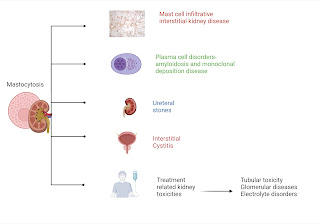A recent review by us in NDT discusses the kidney involvement in systemic mastocytosis.
Systemic mastocytosis(SM) is a clonal mast cell disorder due to a somatic gain-of-function mutation in the KIT gene resulting in mast cell accumulation in tissues. SM manifests as symptoms related to mast cell mediator release (flushing, pruritus, cramps, diarrhea, bronchospasm, angioedema) and organ damage. Skin involvement is frequent, esp. in indolent SM, red-brown macules and papules, fine telangiectasias, urticate on stroking
Kidney involvement: 1)Paraprotein-related kidney disease like light chain amyloidosis and MIDD, common association between plasma cell dyscrasia and SM 2)Immune-mediated GN like mesangial proliferative GN, membranous GN, and diffuse proliferative GN. Hypothesis- Increased circulating immune complexes and vasodilatory mediators released by mast cells increase glomerular permeability. 3)nephrotoxicity of drugs to treat SM: IFN-alpha, bisphosphonates, tyrosine kinase inhibitors
4)nephro-urolithiasis: increased prevalence in SM. Be careful of mast cell mediator release from treatment used for stones. Avoid radiocontrast agents, use pre-operative steroids, use selective COX-2 inhibitors
5)bladder mast cell infiltration causing interstitial cystitis
Treatment of SM-directed therapy includes agents to control mediator release, and mast cell clone directed therapy, interstitial nephritis is typically treated with glucocorticoids in addition.
Although rare, kidney involvement is increasingly described, either direct or indirect


No comments:
Post a Comment